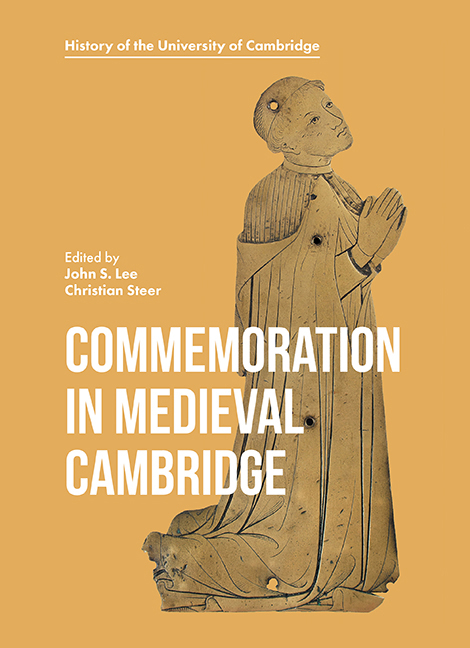Book contents
- Frontmatter
- Contents
- List of Illustrations
- Acknowledgements
- List of Contributors
- Abbreviations
- Introduction: In Fellowship with the Dead
- 1 Monuments and Memory: A University Town in Late Medieval England
- 2 The Commemoration of the Living and the Dead at the Friars Minor of Cambridge
- 3 The City of London and the Founding of the Guild of Corpus Christi
- 4 Patrons and Benefactors: The Masters of Trinity Hall in the Later Middle Ages
- 5 A Comparison of Academical and Legal Costume on Memorial Brasses
- 6 Commemoration at a Royal College
- 7 Cambridge Commemorations of Lady Margaret Beaufort's Household
- 8 ‘The Stones are all disrobed’: Reasons for the Presence and Absence of Monumental Brasses in Cambridge
- Bibliography
- Index
3 - The City of London and the Founding of the Guild of Corpus Christi
Published online by Cambridge University Press: 25 October 2019
- Frontmatter
- Contents
- List of Illustrations
- Acknowledgements
- List of Contributors
- Abbreviations
- Introduction: In Fellowship with the Dead
- 1 Monuments and Memory: A University Town in Late Medieval England
- 2 The Commemoration of the Living and the Dead at the Friars Minor of Cambridge
- 3 The City of London and the Founding of the Guild of Corpus Christi
- 4 Patrons and Benefactors: The Masters of Trinity Hall in the Later Middle Ages
- 5 A Comparison of Academical and Legal Costume on Memorial Brasses
- 6 Commemoration at a Royal College
- 7 Cambridge Commemorations of Lady Margaret Beaufort's Household
- 8 ‘The Stones are all disrobed’: Reasons for the Presence and Absence of Monumental Brasses in Cambridge
- Bibliography
- Index
Summary
The notebook written by John Hardy in about 1358 is the most valuable evidence for the background to the foundation of Corpus Christi College, and has long been known to historians of the university of Cambridge. It is in effect an informal set of accounts, recording donations and promises to the new Guild of Corpus Christi, and the expenses incurred, most of which concern local citizens. Previous historians, focussing on the local angle, have been puzzled by entries on a page headed ‘Henry duke of Lancaster’, which contains names of one or two men associated with him, and then a series of other names which were dismissed by the first editor as probably of men of modest standing, of whom there was no other record. In fact, these names are those of some of the foremost citizens of London, including Andrew Aubrey, mayor of London and not only a wealthy man but an important political figure of his generation. This chapter reviews what we know about this group of Londoners, and tentatively suggests possible reasons for their involvement with the college's foundation, highlighting John of Tamworth, the head of the king's chancery, and his role in the process, which Hardy acknowledged by calling him the chief promoter of the college's cause.
Hardy's notebook is a paper booklet of thirty-six pages, written over a period of almost a decade. This is the source of most of our detailed knowledge about the Guild of Corpus Christi from 1350 to 1358, the period when the idea of founding a new college was conceived and put into effect. It was printed very accurately in 1903 by Mary Bateson, though the order of pages was incorrect when she worked on it. It has been cleaned and restored in recent years, and the leaves have now been correctly reordered. John Hardy, as a stationer, was a professional scribe, and his work is reasonably systematic, particularly as the entries are more in the nature of memoranda than of an organised account of the transactions that took place. Catherine Hall, the college's archivist for many years, has skilfully analysed the contents of the manuscript and the way in which they are organised, beginning with the minutes of the meeting in January 1350 at which two treasurers were elected, and a number of people, either individuals or families, were admitted to the guild.
- Type
- Chapter
- Information
- Commemoration in Medieval Cambridge , pp. 52 - 60Publisher: Boydell & BrewerPrint publication year: 2018
- 1
- Cited by



